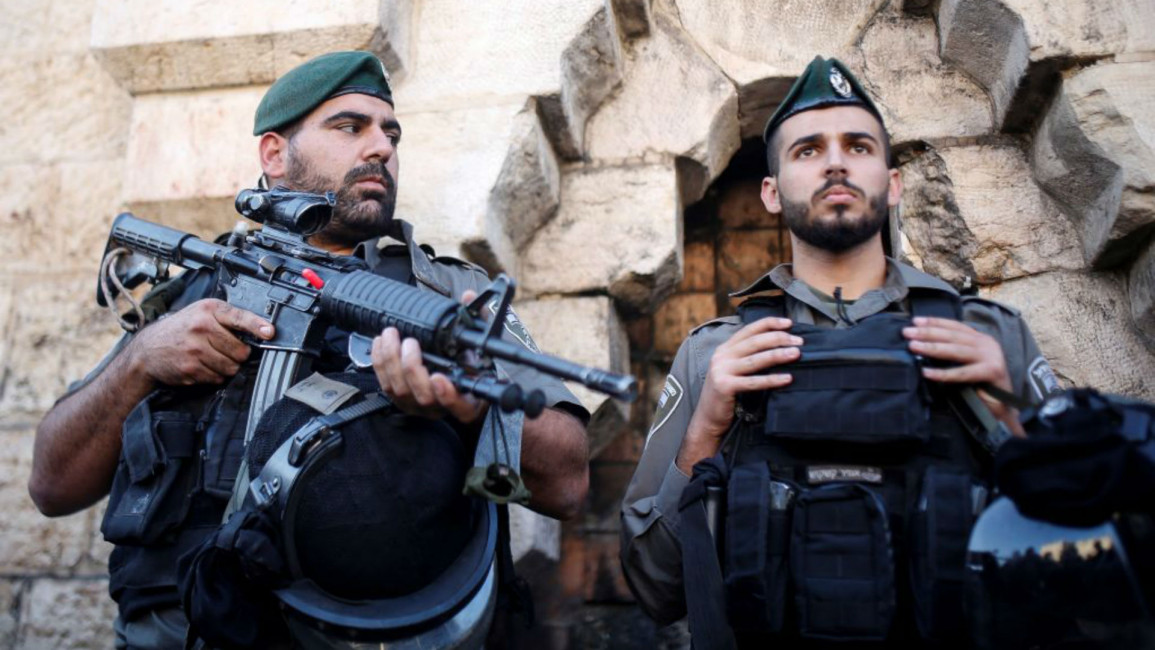
For real solidarity, stop arming Israel
The murder of 60 Palestinians by Israeli forces during the Great Return March in Gaza, has meant over 100 have been killed since the protests began last month, and thousands more wounded.
The outcry by groups and individuals across the UK showed that despite the severe crackdown on activism for Palestine over the last few years, many continue to stand with its people, and reject the UK government's complicity in the continued colonial violence against Palestinians.
Thousands attended the emergency demonstration called outside 10 Downing Street by various organisations including the Palestine Solidarity Campaign, Stop the War, and Friends of Al-Aqsa, to denounce the killings, and call on the UK government to stop arming Israel. The protest was an important symbolic action, but it is imperative that it is followed by practical action on a local and national level.
At times, elements of doubt exist around our ability to act, and some hesitate over the effectiveness of our tactics in lobbying the government in order to directly challenge Israel's ongoing occupation and blockade of Gaza. But the arms trade, I would argue, is a clear and crucial target.
Since the killing of thousands of Palestinians in the attacks on Gaza in 2014 - otherwise known as Operation Protective Edge - it has been reported that $445 million worth of arms sales to Israel has been approved by the UK.
 |
The protest was an important symbolic action, but it is imperative that it is followed by practical action on a local and national level |  |
This includes drone components, spare parts for sniper rifles and combat aircraft. Middle East Eye's Diplomatic Editor, Jamie Merrill, in his exclusive report pointed out that, "government data will raise fresh concerns that British-made weapons are being used by the Israeli military in the Occupied Territories, amid fears that components in sniper rifles used to kill scores of Palestinian civilians in recent weeks could have been made in the UK".
Furthermore, War on Want highlighted that in 2016 alone, the UK government granted more than $130 million worth of licenses for the export of arms to Israel. Banks such as HSBC are "key players in the UK-Israel arms trade by providing financial services to companies that allow for these deadly arms sales. Far from being the removed outsiders that they claim to be, UK high street banks are profiting from the UK-Israel arms trade."
Read more: Stand with Gaza and stop banking on apartheid
Senior Campaigns Officer of militarism and security at War on Want, Ryvka Barnard highlighted that the continued licensing of arms export to Israel, "means that the UK government is acting against its own policies, and knowingly providing what may be material support for war crimes".
Whilst it may feel like a mammoth-sized task to take on multi-billion-dollar arms companies and trade deals between some of the most powerful countries in the world, the growing public concern and activist efforts are forcing some senior officials to respond.
Twitter Post
|
The initial deaths during the weekly Friday demonstrations in Gaza prompted United Nations Secretary-General Antonio Guterres to call for an independent investigation, which was reinforced by UN human rights experts who added that Israel's recent actions could be in breach of the Fourth Geneva Convention.
Members of parliament took to social media to condemn the attacks, including Labour leader Jeremy Corbyn. The Green Party's co-leader Caroline Lucas called out the government for its continued role in allowing the arms trade to "profit from mass murder by the criminal Israeli government".
Even Labour's shadow foreign secretary Emily Thornberry, who is also a member of Labour Friends of Israel, issued a statement condemning the "brutal, lethal and utterly unjustified actions on the Gaza border".
She also called on Israeli forces serving on the Gaza border "to show some long-overdue responsibility to their fellow human beings, and stop this vicious and utterly avoidable slaughter of peaceful protesters demanding the right to return to their homes".
While I - along with many others - hold little faith in the moral conversion of snipers who senselessly shoot Palestinians, her appeal raises the possibility of Britain applying an arms embargo.
It is now that our movements must act in order to turn these words and good sentiments into action.
Whether in workplaces, local councils, colleges or universities, we should bring together all those people who are outraged at the massacres in Gaza, the treatment of Palestinians at the hands of Israel in general, and the continued complicity of our government.
These groups can then form campaigns that put pressure on local MPs to vote against continued arms trade with Israel in parliament, get colleagues and local residents to close their HSBC accounts, or campaign against local government contracts for companies who continue to profit from the occupation and dispossession of Palestinians. The highly successful 'Dump Veolia' campaign is a good example.
A lot of this original groundwork has already been done in Higher Education. The Campaign Against the Arms Trade (CAAT) Universities Network, has long been campaigning against the links between universities and arms companies.
 |
It's a struggle for our right to democratically decide where we invest our money |  |
While it is shocking to think that educational spaces are being used to exploit young people's labour for further death and destruction around the world, the climate of privatisation within higher education has enabled this. Students, like many at the University of Manchester for example, are finding themselves working with BAE systems to develop new drones, which can then be used in more murderous wars abroad.
Students and staff should shame investment decisions publically, campaign on campus to sever these ties, and build broad alliances with different communities and campaigns to achieve an ethical investment policy on campus.
The struggle against Israel's ongoing violence against the Palestinian people is also a struggle against our own government's continued support for those actions.
More than that, it is a struggle for our right to democratically decide where we invest our money, what political projects our institutions, governments and workplaces are associated with, and what kind of society and world we want to build.
The people of Palestine deserve all our solidarity, and that solidarity begins at home.
Malia Bouattia is an activist, a former president of the National Union of Students, and co-founder of the Students not Suspects/Educators not Informants Network.
Follow her on Twitter: @MaliaBouattia
Opinions expressed in this article remain those of the author and do not necessarily represent those of The New Arab, its editorial board or staff.




